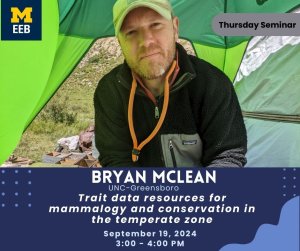Presented By: Ecology and Evolutionary Biology
EEB Thursday Seminar Series - Trait data resources for mammalogy and conservation in the temperate zone
Bryan McLean, UNC-Greensboro

This event is part of our ongoing Thursday Seminar Series.
About the seminar: Successful biodiversity monitoring relies on understanding how organisms apportion energy towards growth, maintenance, and reproduction. Phenotypic proxies can be useful for inferring these processes, but open and freely available trait data remain sparse for most clades, including mammals. This talk will discuss research on energetically expensive traits that are also seasonally plastic in some mammals, including body size, brain size, and gastrointestinal size and form. I will discuss my lab’s work to leverage these exciting proxies for energetic insights in small mammals in the Southern Appalachian Mountains. I will also discuss the global landscape of available phenotypic trait data for mammals, and highlight new collaborative efforts to digitize specimen-level traits by a consortium of North American mammal collections. Assembling both standard and non-standard traits from specimens holds amazing promise for advancing mammalogy, monitoring mammal populations globally, and introducing a new generation of STEM students to ecological and evolutionary concepts using digital specimen data.
About the seminar: Successful biodiversity monitoring relies on understanding how organisms apportion energy towards growth, maintenance, and reproduction. Phenotypic proxies can be useful for inferring these processes, but open and freely available trait data remain sparse for most clades, including mammals. This talk will discuss research on energetically expensive traits that are also seasonally plastic in some mammals, including body size, brain size, and gastrointestinal size and form. I will discuss my lab’s work to leverage these exciting proxies for energetic insights in small mammals in the Southern Appalachian Mountains. I will also discuss the global landscape of available phenotypic trait data for mammals, and highlight new collaborative efforts to digitize specimen-level traits by a consortium of North American mammal collections. Assembling both standard and non-standard traits from specimens holds amazing promise for advancing mammalogy, monitoring mammal populations globally, and introducing a new generation of STEM students to ecological and evolutionary concepts using digital specimen data.